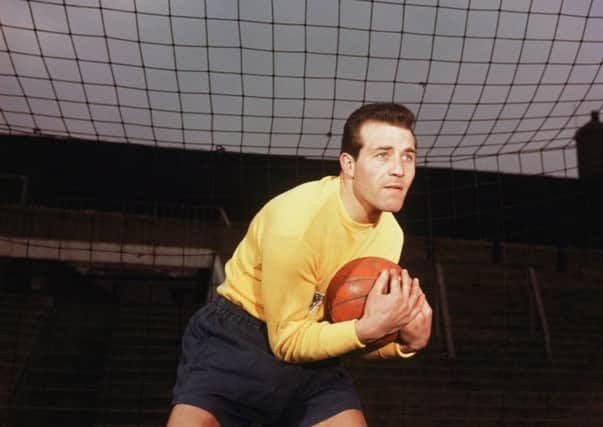Obituary: Ronald Springett, former England goalkeeper


RON Springett isn’t often mentioned in discussion of England’s greatest goalkeepers. He certainly wasn’t as good as Gordon Banks, the man who replaced him both as England’s first-choice and most-capped ‘keeper, but, few, if any were.
Small for the position, he overcame his physical limitations with great judgment, terrific timing and immense courage but, he played at a time when the special demands of the position were not as valued as they became later. He was, however, definitely international-class.
Advertisement
Hide AdAdvertisement
Hide AdThe son of Percy, a goalkeeper himself, who had never got beyond Queens Park Rangers’ junior sides, Ron Springett failed a trial with local side Fulham as a teenage apprentice fitter. He then tried again with his father’s old club, was taken on in 1953 and made his debut, as a 20-year-old, against Norwich in 1955.
National Service interrupted his progress – he was involved in the ill-fated Suez campaign in 1957, but, once back full-time with QPR, he was selected for the Third Division South representative team, before Sheffield Wednesday paid £16,000 to take him to Hillsborough in a £10,000 bargain deal.
He would spend nine years in Yorkshire, but, throughout this period, he continued to live in London, training with QPR and only seeing his teammates on match-days.
Injury to Burnley’s Colin McDonald caused a vacancy in the England team. Springett impressed in “auditions” with the Football League XI, before he replaced Eddie Hopkinson of Bolton for the Home International against Northern Ireland, at Wembley in November, 1959. He was one of four new caps that night. Centre-half Ken Brown of West Ham was never capped again, Joe Baker of Hibs and Ray Parry of Bolton both had scoring debuts – Springett saved a Jimmy McIlroy penalty, as England won 2-1.
Springett back-stopped England for 29 of the next 30 games. These were good days for England, who during the 1960-61 season scored at will. But, defensively, they were porous and Springett managed only five clean sheets in his 33 internationals, during which he conceded an average of 1.42 goals per game. He faced Scotland in three straight years. The 1960 Hampden clash saw Springett make some great saves to deny Ian St John in particular, as Scotland “murdered” England 1-1. The Wembley game in 1961 is best glossed-over from a Scottish viewpoint, as England fired “nine past Frank Haffey” in the Scotland goal and, in 1962, Springett was beaten by Davie Wilson and an Eric Caldow penalty, as Scotland scored their first Hampden win over the Auld Enemy for 25-years.
Springett famously kept a dossier on potential penalty-takers against him; perhaps he didn’t have Caldow’s details as the Scotland captain netted the winner from the spot.
He went to Chile for the 1962 World Cup Finals as England’s Number One, playing well as the Lilywhites reached the last eight. He was unfairly criticised for being beaten by a couple of Garrincha efforts, as England went down 3-1 to Brazil, but, he made some other excellent saves in that and the other matches in South America. In that match against Brazil, he had won his 25th cap, passing Bert Williams of Wolves as England’s most-capped custodian.
The following season, Sir Alf Ramsey took over from Sir Walter Winterbottom as England boss, but, initially, he kept faith with Springett. However, after France fired five goals past him in Paris in February, 1963, Ramsey turned to Gordon Banks as his first-choice goalkeeper.
Advertisement
Hide AdAdvertisement
Hide AdSpringett became the patient reserve, playing just four more internationals over the next three seasons, his international swan song coming in a 6-1 win over Norway, in Oslo in June, 1966. Just a month earlier he had been in goal for Sheffield Wednesday as they lost 3-2 to Everton in the FA Cup Final, and he would be back at Wembley, albeit as an unused reserve, for the 1966 World Cup finals, during which Banks played every game.
Only the 11 Englishmen who actually played against West Germany in that iconic World Cup Final received winners’ medals, until, in 2009, Fifa relented and retrospectively awarded medals to the unused players, including Springett, in the 22-man squad. His spell with Sheffield Wednesday ended in unusual circumstances, after 350 games, in 1967, when he was transferred back to QPR, with younger brother Peter, an England Under-23 cap, going in the opposite direction in a £50,000 deal.
Back at Loftus Road full-time, Ron took his QPR matches played total to 150, before retiring in 1969. Only, he didn’t entirely retire, switching to playing at centre forward in a local Sunday league team.
He opened a sports shop in the Uxbridge Road, near Loftus Road, before selling this business and spending the years until his formal retirement running a painting and decorating and gardening business.
Springett is survived by Barbara, whom he had married in 1958, and daughters Robyn and Terri. Terri, who has maintained the Springett family’s three-generation link with QPR by becoming the club secretary, followed her father into the England team, albeit the women’s version.